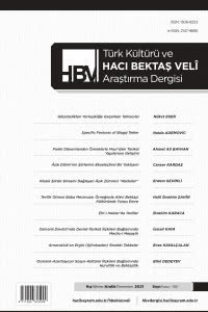MİLLİ KÜTÜPHANE’DE “06 MİL YZ 4573-1” NUMARASI İLE KAYITLI MECMUA VE MUHTEVASI
Cönkler ve mecmualar yüzyıllar boyu âşık edebiyatının ve halk kültürünün en önemli kaynaklarından biri olmuştur. Bu makalede ele alınan mecmua içinde kayıtlı âşıkları ve şiirlerini gün yüzüne çıkararak bu kaynaklardan birini daha Türk kültür çalışmalarına kazandırma amacı güdülmüştür. Üzerinde çalışılan kaynak 1951 yılında tamamlanmış ve Milli Kütüphane’de “06 Mil Yz A 4573- 1” numarası ile kayıtlı olan mecmuadır. Bu çalışmada âşıkların mahlasları ve o mahlaslara ait şiirleri alfabetik sıra ile sayfa numaraları da verilerek belirtilmiştir. Karşılaşılan şiirlerin çoğu Alevi ve Bektaşi kültüründen izler taşımaktadır. Şiirlerin genel konusu dini-tasavvufi çerçevede olsa da din dışı şiirler de kendine yer bulmuştur. Mecmuanın ise kim tarafından yazıldığı bilinmemektedir. Çoklukla yazım hataları yapılmıştır. Hece ve kafiyenin de bazen bozulduğu görülür. Çalışma temelde üç bölümden oluşmaktadır. Giriş bölümünde cönk ve mecmuaların tarihsel değeri üzerinde durulmuştur. Âşıkların toplum içerisinde oynadığı rollere kısaca değinilmiş geçmiş ile şimdi arasında olan bağ açıklanmaya çalışılmıştır. İkinci bölümde ise şiirleri teknik yönden değerlendirip işlenen konular belirtilmiştir. Her bir şairi teker teker değerlendirmek yerine genel yargılara varma yoluyla devam eden çalışma karşılaşılan bazı kusurların incelenerek bu kusurların nedenlerine odaklanmış, ölçü ve kafiye konusuna değinmiştir. Son bölümde de alfabetik sıra içerisinde âşıkların başlıkları açılmış, bu başlıkların altında ise sayfa sırasına göre o âşıklara ait şiirlerin ayaklarına yer verilmiştir. Hece ve aruz kullanan şiirler birbirinden ayırt edilerek belirtilmiştir.
Poetry Collection and Its Contents That Registered in the National Library with the Number “06 Mil Yz 4573-1”
Cönks (a kind of diary or notepad which contains poetries) and poetry collections has been one of the most important sources of folk literature and folk culture for centuries. We also aimed to bring one of these sources to Turkish cultural studies by revealing the folk poets and poems registered in poetry collection that we discussed in this article. The source that we are working on is a poetry collection, which was completed in 1951 and registered in the National Library with the number “06 Mil Yz a 4573-1”. In this study, we indicated the pseudonym of folk poets and the poems of these pseudonym by giving page numbers in alphabetical order. Most of the poems we come across bear traces of the Alevi and Bektashi culture. Although the general subject of the poems is within the religiousSūfī framework, non-religious poems have also found their place. The author of Cönk analysed in this study is not known. Numerous typos have been made. The syllable and rhyme are also sometimes seen to deteriorate. The study consists of three parts. In the introduction, we focused on the historical value of cönks and collections. We briefly touched on the roles of folk poets in society. We tried to explain the connection between the past and the present. In the second part, we evaluated the poems from a technical point of view and mentioned the topics that were addressed. Instead of evaluating each poet individually, we tried to reach general deductions. We examined causes of the defects that we encountered undertaking this research. We touched on the subject of measure and rhyme. In the last part, we opened the titles of folk poets in alphabetical order. Under the titles of folk poets, we included rhyme of the poems belonging to those folk poets in page order. We have mentioned separately the poets who use the syllabic measure and the aruz (Ar.ʿarūḍ) measure.
___
- Millî Kütüphane (06 Mil Yz A 4573-1)
- Çoruhlu, Yaşar. (2011). Türk Mitolojisinin Ana Hatları. İstanbul: Kabalcı Yayınevi.
- Kaya, Doğan. (2020). Türk Dünyası Ansiklopedik Türk Halk Edebiyatı Kavramları ve Terimleri Sözlüğü. Ankara: Akçağ Yayınları.
- Ögel, Bahattin. (2002). Türk Mitolojisi. Ankara: TDK Yayınları.
